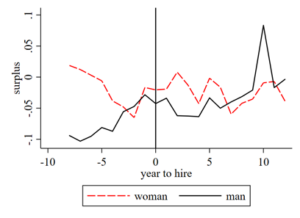Women City Managers Face a Glass Cliff as Local Governments Are More Likely to Hire Them When Budgets Are Collapsing
In recent decades, women have made significant strides in obtaining leadership positions in local governments. While only one percent of chief administrative officers were women in the mid-1970s, the percentage increased to 20 percent in 2009 and has remained relatively stable since. As more women break the glass ceiling in the public and private sectors, researchers Michelle Ryan and Alex Haslam have observed that women often ascend into senior management positions only when the organization is struggling. They coined the term “glass cliff” to describe this phenomenon, and more importantly, its implications. If women are more likely to be hired to lead struggling organizations, they are also more likely to be punished for failing to improve the organizational condition, a tall order given the problematic organizational circumstances.
In new research, we test the glass cliff hypothesis in municipal management. An elected council appoints a professionally trained manager to oversee day-to-day municipal operations. This is similar to corporate boards appointing a chief executive officer. Municipal managers are responsible for supervising municipal employees, proposing the budget, and directing the delivery of vital public services. Municipal managers are typically well educated and well paid. Like other organizations, hiring councils may associate effective leadership with masculine traits such as being competitive, ambitious, and self-assertive. In municipal government, managers must lead many traditionally male-dominated fields, such as police, fire, public utilities, and solid waste management.
Women are often given control in cities already in distress
Our original data from Florida shows that women are more likely to be hired as municipal managers when the municipality experiences declining budget solvency, that is, the revenue collection is less able to cover expenditures over time. In Figure 1 below, municipal governments that later hire a woman as manager see a drop in budget solvency (computed as the ratio between surplus/deficit to expenditure) on average in the years prior to the hire, while the trend is upward sloping for those that later hire a man.
Figure 1 – Local government budget solvency and hiring of men and women managers
